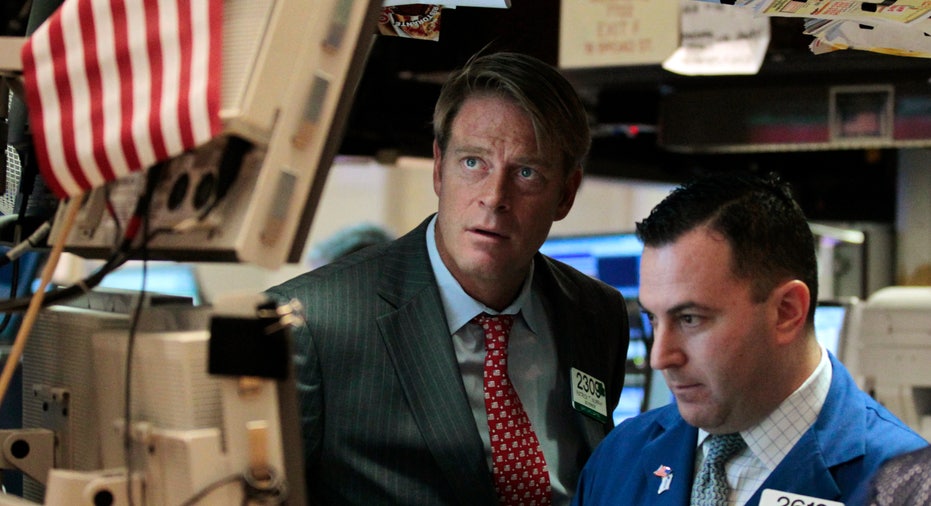Selling Accelerates on Wall Street

FOX Business: The Power to Prosper
The markets took a sharp turn to the downside in afternoon trading as market participants were cautious to hold on to positions ahead of the weekend.
Today's Markets
As of 2:40 p.m. ET, the Dow Jones Industrial Average dropped 159 points, or 1.4%, to 10,993, the S&P 500 dipped 19.5 points, or 1.7%, to 1,140 and the Nadsaq Composite fell 48 points, or 1.9%, to 2,432.
Economic data releases were mixed on Friday, however, the broadly negative trend for the economy still spooked traders. Indeed, in a sign of the fears, the Treasury yields have fallen sharply: the benchmark 10-year note is presently yielding 1.9% from 2.001%.
Personal income fell 0.1% in August, the first decline since October 2009, and weaker than the 0.1% gain economists anticipated. Consumer spending was up 0.1% for the month, which was in line with expectations.
Meanwhile, the final reading of the Reuters/University of Michigan showed consumer sentiment edged up in late September, but remained glum. Consumer sentiment came in at 59.4 in September, from a previous reading of 57.8, and higher than estimates of 57.8.
Consumption is a key component in economic expansion, and can have an impact on many sectors. In particular, retailers like Target (NYSE:TGT) can be affected by these data, especially with just months to go before the key holiday buying season this winter.
Manufacturing in the Chicago region expanded quicker than economists expected in September. The Institute for Supply Management's gauge rose to 60.4 from 56.5, easily topping expectations of 55.5. The Chicago report comes ahead of the more closely-tracked nationwide report, and generally correlates reasonably well with that report, according to economists at Nomura.
The manufacturing sector took a hard hit from several economic factors, including high energy prices, and lingering supply-chain impacts of the earthquake that slammed Japan in March.
The Chinese manufacturing sector contracted for a third-straight month in September, adding to worries that the world's second-largest economy may be slowing down.
Inflation in the euro zone picked up speed drastically in September, soaring 3% from 2010, a quicker pace than the 2.5% in August, and well above the European Central Bank's inflation target of 2%. Indeed, September marked the swiftest increase since October 2008.
"This development is likely to limit the ECB's willingness to provide more monetary stimulus, despite recent poor news on activity," economists at Barclays Capital wrote in a research note.
Also on the euro zone front, Austria's parliament approved giving the region's sovereign rescue fund additional powers to help aid with bailouts such of that of Greece. Germany's lower house approved the changes on Thursday, considered to be one of the most crucial votes of confidence, but all of the 17 currency members of the currency bloc must agree.
Negotiations were ongoing in Greece between international inspectors, called the "troika," regarding the next tranche of funding the country needs to avoid defaulting in October.
In currencies, the euro sunk 1% against the U.S. dollar, while the greenback rose 0.62% against a basket of world currencies.
Energy markets were mixed, shedding heavy losses. Light, sweet crude fell $1.00, or 1.2%, to $81.13 a barrel. Wholesale RBOB gasoline rose 3 cents, or 1.1%, to $2.59 a gallon.
Gold climbed $5.00, or 0.31%, to $1,622 a troy ounce. The precious metal is headed for its worst monthly fall since the financial crisis in 2008.
Foreign Markets
The Euro Stoxx 50 slid 1.5% to 2,180, the English FTSE 100 fell 1.3% to 5,197 and the German DAX tumbled 2.4% to 5,402.
In Asia, the Japanese Nikkei 225 slipped 0.01% to 8,700 and the Chinese Hang Seng dipped 2.3% to 17,592.



















